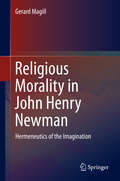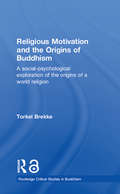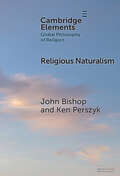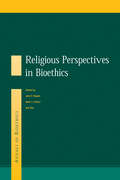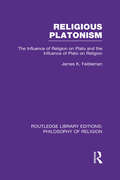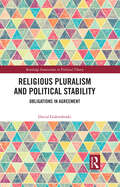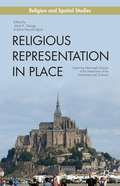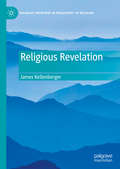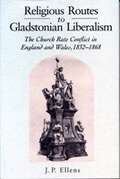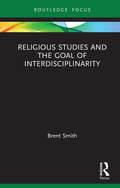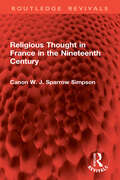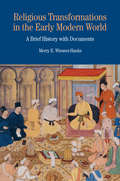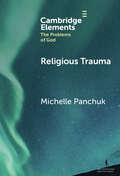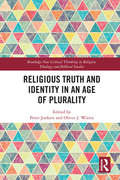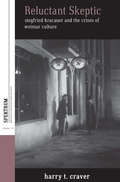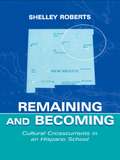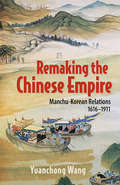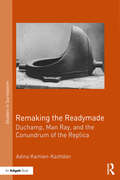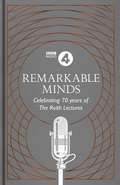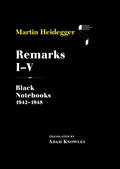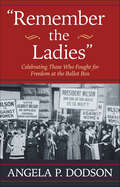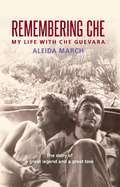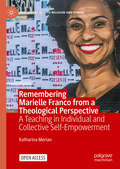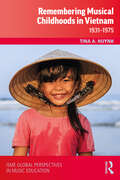- Table View
- List View
Religious Morality in John Henry Newman
by Gerard MagillThis book is a systematic study of religious morality in the works of John Henry Newman (1801-1890). The work considers Newman's widely discussed views on conscience and assent, analyzing his understanding of moral law and its relation to the development of moral doctrine in Church tradition. By integrating Newman's religious epistemology and theological method, the author explores the hermeneutics of the imagination in moral decision-making: the imagination enables us to interpret complex reality in a practical manner, to relate belief with action. The analysis bridges philosophical and religious discourse, discussing three related categories. The first deals with Newman's commitment to truth and holiness whereby he connects the realm of doctrine with the realm of salvation. The second category considers theoretical foundations of religious morality, and the third category explores Newman's hermeneutics of the imagination to clarify his view of moral law, moral conscience, and Church tradition as practical foundations of religious morality. The author explains how secular reason in moral discernment can elicit religious significance. As a result, Church tradition should develop doctrine and foster holiness by being receptive to emerging experiences and cultural change. John Henry Newman was a highly controversial figure and his insightful writings continue to challenge and influence scholarship today. This book is a significant contribution to that scholarship and the analysis and literature comprise a detailed research guide for graduates and scholars.
Religious Motivation and the Origins of Buddhism: A Social-Psychological Exploration of the Origins of a World Religion (Routledge Critical Studies in Buddhism #Vol. 25)
by Torkel BrekkeWhy did people in North India from the 5th century BC choose to leave the world and join the sect of the Buddha? This is the first book to apply the insights of social psychology in order to understand the religious motivation of the people who constituted the early Buddhist community. It also addresses the more general and theoretically controversial question of how world religions come into being, by focusing on the conversion process of the individual believer.
Religious Naturalism (Elements in Global Philosophy of Religion)
by John Bishop Ken PerszykIs a religious naturalism possible? 'Scientific' naturalism accommodates only 'thin' religiousness. A more robust religious naturalism posits an ultimate reality that supports the ideals of eco-morality and the hope that human fulfilment may be achieved by following those ideals. Such an account may yet be 'expansively' naturalist in taking the natural world to be the only (concrete) reality, and in not going against, only beyond, well-confirmed science. For the core content of an expansive religious naturalism, this Element proposes the idea of an inherent integrative cosmic purpose. The authors reflect both on Indigenous worldviews and on theist traditions in pursuing this proposal.
Religious Perspectives on Bioethics (Routledge Annals of Bioethics)
by Mark CherryFirst published in 2004. Routledge is an imprint of Taylor & Francis, an informa company.
Religious Platonism: The Influence of Religion on Plato and the Influence of Plato on Religion (Routledge Library Editions: Philosophy of Religion)
by James Kern FeiblemanIn Plato’s Laws is the earliest surviving fully developed cosmological argument. His influence on the philosophy of religion is wide ranging and this book examines both that and the influence of religion on Plato. Central to Plato’s thought is the theory of forms, which holds that there exists a realm of forms, perfect ideals of which things in this world are but imperfect copies. In this book, originally published in 1959, Feibleman finds two diverse strands in Plato’s philosophy: an idealism centered upon the Forms denying full ontological status to the realm of becoming, and a moderate realism granting actuality equal reality with Forms. For each strand Plato developed a conception of religion: a supernatural one derived from Orphism, and a naturalistic religion revering the traditional Olympian deities.
Religious Pluralism and Political Stability: Obligations in Agreement (Routledge Innovations in Political Theory)
by David GolemboskiThis book argues that the principles and institutions of political liberalism are necessary conditions for achieving reliable stability amid conditions of pluralism. Only a political system of this sort can bring citizens’ moral, religious, and political loyalties into robust agreement. Through an analysis that encompasses normative political theory and American constitutional law, David Golemboski illustrates the implications of this conclusion by examining contemporary legal debates in law and religion. By developing a fresh perspective on how legal frameworks for religious exercise and establishment can ameliorate conflict and enhance the stability of a liberal constitution, this book demonstrates that political systems need not subordinate or sacrifice important liberal priorities in favor of stability. Rather, those liberal priorities are themselves necessary components of a stable order. Religious Pluralism and Political Stability will be of interest to scholars across the fields of political philosophy, legal theory, and constitutional law who have an interest in religion.
Religious Representation in Place: Exploring Meaningful Spaces at the Intersection of the Humanities and Sciences (Religion And Spatial Studies)
by Mark K. George Daria Pezzoli-OlgiatiReligious Representation in Place.
Religious Revelation (Palgrave Frontiers in Philosophy of Religion)
by James KellenbergerThis book addresses several dimensions of religious revelation. These include its occurrence in various religious traditions, its different forms, its elaborations, how it has been understood by Western theologians, and differing views of revelation’s ontological status. It has been remarked that revelation is most at home in theistic traditions, and this book gives each of the three Abrahamic traditions – Judaism, Christianity, and Islam – its own chapter. Revelation, however, is not limited to theistic traditions; forms found in Buddhism and nondevotional (nontheistic) Hinduism are also explored. In the book’s final chapter a particularly significant form of religious revelation is identified and examined: pervasive revelation. The theistic manifestation of this form of revelation, pervasive in the sense that it may occurs in all the domains or dimensions of human existence, is shown to be richly represented in the Psalms, where God’s presence may be found in the heavens, in the growing of grass, and in one’s daily going out and coming in. Pervasive revelation of religious reality is also shown to be present in the Buddhist tradition.
Religious Routes to Gladstonian Liberalism: The Church Rate Conflict in England and Wales 1852–1868 (G - Reference, Information and Interdisciplinary Subjects)
by Jacob EllensThis book, covering the period 1832 to 1868, describes how the so-called "church rates" controversy contributed to the rise of a secular liberal state in England and Wales. The church rate was an ancient tax required of all ratepayers, regardless of denomination, for the upkeep of parish churches of the Church of England. This meant that Dissenters and other non-Anglicans paid for the support of the established Church. In the 1830s, however, the Dissenters determined to tolerate the situation no longer. The resulting thirty-six-year struggle became the central church-state issue of the Victorian period. Ellens further argues that church rates played a pivotal role in the shaping of Victorian liberalism. Dissenters desired a society in which church and state would be separate and religious affairs voluntary. When Gladstone decided to champion the Dissenters' "voluntaryist" cause in the 1860s, he established the relationship that would give him the solid basis of electoral strength he needed to carry out the great liberal reforms of his governments after 1868. Elegantly written and argued, this book carefully details the process of disestablishment in England and Wales and uncovers an important and little-recognized dimension to the formation of the Liberal party.
Religious Studies and the Goal of Interdisciplinarity (Routledge Focus on Religion)
by Brent SmithThis book offers a survey of the development of interdisciplinarity in religious studies within academia and offers ways for it to continue to progress in contemporary universities. It examines the use of the term ‘interdisciplinary’ in the context of the academic study of religion and how it shapes the way scholarly work in this field has developed. The text uses two main elements to discuss religious studies as a field. Firstly, it looks at the history of the development of religious studies in academia, as seen through an interdisciplinary critique of the university as an epistemological project. It then uses the same interdisciplinary critique to develop a foundation for a 21st-century hermeneutic, one which uses the classical concepts reprised by that interdisciplinary critique and retools the field for the 21st century. Setting out both the objects of religious studies as a subject and the techniques used to employ the study of those objects, this book offers an invaluable perspective on the progress of the field. It will, therefore, be of great use to scholars of research methods within religious studies.
Religious Thought in France in the Nineteenth Century (Routledge Revivals)
by Canon W. SimpsonFirst published in 1935, Religious Thought in France in the Nineteenth Century discusses various religious thoughts prevalent in France during the nineteenth century, along with prominent figures associated with them. The author explores Positivist Religion, Natural Religion, and Older and Newer Protestantism. He then talks about the modernist movement in France through the life and career of distinguished critic Alfred Loisy. The author goes on to examine the future of religion and the influence of Bergson and provides a commentary on the biblical and historical studies among Catholics, Catholic studies of Dogma and the preachers in Paris like Mgr. de Quélen, Jesuit Ravignan, Jesuit Félix, Père Hyacinthe and Monsabré, to name a few. Simpson concludes his book with a discussion on the influence of Church on literary men – Bourget, Huysmans, Faguet, and Brunetière.
Religious Transformations in the Early Modern World: A Brief History With Documents (Bedford Cultural Editions Series)
by Merry E. Wiesner-HanksThe early modern period witnessed sometimes startling, sometimes subtle transformations in the religious and intellectual life of peoples across the globe. For reasons that varied widely, leaders and thinkers from Mexico to the Ottoman Empire and from China to the Indian subcontinent sought to reform existing religions, develop new spiritual practices, promote innovative texts, and, on occasion, even create new religions. <P><P>Presenting documents from different regions and different religious and philosophical traditions, including Islam, Judaism, Sikhism, Christianity, and Confucianism, this volume allows students to explore and analyze these varied transformations. A general introduction introduces the framework for examining the chapter case studies, while the chapters provide context, a group of primary sources, and a set of questions to consider. Useful pedagogic supports include headnotes to the documents, a chronology, a set of broader questions to consider that help students compare transformations, a selected bibliography, and an index.
Religious Trauma (Elements in the Problems of God)
by Michelle PanchukWhen religion is the cite of abuse and trauma, it can deeply impact a person's ability to relate to God and engage in spiritual practice. As such, religious trauma is ripe for philosophical exploration. The first section of this Element provides a brief history of the concept of psychological trauma, contemporary accounts of its neurobiological basis, and its impact on human agency. The second sketches a model of religious trauma through the first-person narratives of survivors and emerging psychological data. Section three explores the social epistemology of religious trauma, focusing on how failures of knowledge create space for religious abuse and the insights of survivors may help communities guard against it. The last two sections consider three perennial topics in philosophy of religion from the perspective of religious trauma: the problem of evil, the problem of divine hiddenness, and religious experience.
Religious Truth and Identity in an Age of Plurality (Routledge New Critical Thinking in Religion, Theology and Biblical Studies)
by Peter Jonkers Oliver J. WiertzThis book deals with the intellectual aspects of having diverse religious expressions in proximity and the socio-political consequences. It provides a multi-disciplinary perspective on this complex subject, cross-fertilizing work on religious plurality with truth-claims from theologians as well as philosophers from the continental and analytic traditions. The book includes three major parts. Part 1 explores the ideas around religious diversity and truth; Part 2 draws out the epistemic import of religious diversity; and Part 3 concludes the volume by examining the practical and social aspects of religious diversity. Bringing a transdisciplinary perspective to a topic that remains at the forefront of conversation around the religious life of the world, this book will be of great interest to scholars of Religious Studies, Theology and the Philosophy of Religion.
Reluctant Skeptic: Siegfried Kracauer and the Crises of Weimar Culture (Spektrum: Publications of the German Studies Association #14)
by Harry T. CraverThe journalist and critic Siegfried Kracauer is best remembered today for his investigations of film and other popular media, and for his seminal influence on Frankfurt School thinkers like Theodor Adorno. Less well known is his earlier work, which offered a seismographic reading of cultural fault lines in Weimar-era Germany, with an eye to the confrontation between religious revival and secular modernity. In this discerning study, historian Harry T. Craver reconstructs and richly contextualizes Kracauer’s early output, showing how he embodied the contradictions of modernity and identified the quasi-theological impulses underlying the cultural ferment of the 1920s.
Remaining and Becoming: Cultural Crosscurrents in An Hispano School (Sociocultural, Political, and Historical Studies in Education)
by Shelley RobertsRemaining and Becoming: Cultural Crosscurrents in an Hispano School deals with the politics of identity and the concept of boundaries during a time of rapid change. It investigates how the role of schooling for Hispanos in the Norteño School District (a pseudonym) in Northern New Mexico--a public school district, not fully consolidated until 1972--has changed significantly over the past three generations. Today, the Hispanos, a minority in the outside world but a majority in their own, are debating how the functions of the school should respond to the changes resulting from the coming of public education to their region. But the contemporary story of education in Norteño has much deeper roots in the political, religious, and cultural history of Northern New Mexico--a region where, over a period of several centuries, Spain, Mexico, and the United States each have claimed sovereignty, with differing goals for and attitudes about the welfare of the people. This study is an analysis of the ambiguity of education, the losses and gains that are its consequences, the lingering doubts about the past, and the questions about what future education can and should serve. It is about asking: Is what the students are learning worth as much as what they are forgetting? How does schooling affect the evolving process of asserting, renegotiating, and defending an Hispano identity? By exploring historical factors and ideologies of a particular school within a particular community, Roberts seeks to understand community expectations for the school as a fitting place for its children. The goal is not to generalize from the particular to the universal, but to join others in suggesting that we move away from discussing students in a generic sense and focus instead on looking at them in relation to the community in which they live. The fascinating and largely unknown story this book tells will be of interest to educators, researchers, and students across a range of fields, including sociology of education, educational anthropology, multicultural education, ethnic studies, Chicano studies, and qualitative research in education.
Remaking the Chinese Empire: Manchu-Korean Relations, 1616–1911
by Yuanchong WangRemaking the Chinese Empire examines China’s development from an empire into a modern state through the lens of Sino-Korean political relations during the Qing period. Incorporating Korea into the historical narrative of the Chinese empire, it demonstrates that the Manchu regime used its relations with Chosŏn Korea to establish, legitimize, and consolidate its identity as the civilized center of the world, as a cosmopolitan empire, and as a modern sovereign state.For the Manchu regime and for the Chosŏn Dynasty, the relationship was one of mutual dependence, central to building and maintaining political legitimacy. Yuanchong Wang illuminates how this relationship served as the very model for China’s foreign relations. Ultimately, this precipitated contests, conflicts, and compromises among empires and states in East Asia, Inner Asia, and Southeast Asia – in particular, in the nineteenth century when international law reached the Chinese world. By adopting a long-term and cross-border perspective on high politics at the empire’s core and periphery, Wang revises our understanding of the rise and transformation of the last imperial dynasty of China. His work reveals new insights on the clashes between China’s foreign relations system and its Western counterpart, imperialism and colonialism in the Chinese world, and the formation of modern sovereign states in East Asia. Most significantly, Remaking the Chinese Empire breaks free of the established, national history-oriented paradigm, establishing a new paradigm through which to observe and analyze the Korean impact on the Qing Dynasty.
Remaking the Readymade: Duchamp, Man Ray, and the Conundrum of the Replica (Studies in Surrealism)
by Adina Kamien-KazhdanReplication and originality are central concepts in the artistic oeuvres of Marcel Duchamp and Man Ray. Remaking the Readymade reveals the underlying and previously unexplored processes and rationales for the collaboration between Duchamp, Man Ray, and Arturo Schwarz on the replication of readymades and objects. The 1964 editioned replicas of the readymades sent shock waves through the art world. Even though the replicas undermined ideas of authorship and problematized the notion of identity and the artist, they paradoxically shared in the aura of the originals, becoming stand-ins for the readymades. Scholar-poet-dealer Arturo Schwarz played a crucial role, opening the door to joint or alternate authorship—an outstanding relationship between artist and dealer. By unearthing previously unpublished correspondence and documentary materials and combining this material with newly conducted exclusive interviews with key participants, Remaking the Readymade details heretofore unrevealed aspects of the technical processes involved in the (re)creation of iconic, long-lost Dada objects. Launched on the heels of the centenary of Duchamp’s Fountain, this new analysis intensifies and complicates our understanding of Duchamp and Man Ray’ initial conceptions, and raises questions about replication and authorship that will stimulate significant debate about the legacy of the artists, the continuing significance of their works, and the meaning of terms such as creativity, originality, and value in the formation of art.
Remarkable Minds: A Celebration of the Reith Lectures
by BBC Radio 4IDEAS THAT HAVE THE POWER TO CHANGE THE WORLDThe best of an extraordinary 70 year archive, gathered in one volume for the first time. The prestigious BBC Reith Lectures have been enriching the world with new ideas since 1948. Every year, a world-leading thinker is invited to speak on a topic of their choosing, spanning art, science, nature, technology, history, religion, society, culture, politics and much more. Unearthing forgotten gems as well as sharing the latest in intellectual thought, Remarkable Minds is a time capsule into our changing world that provides wise words for turbulent times. With a foreword by Anita Anand, presenter of the Reith Lectures, and an introduction by Gwyneth Williams, controller of Radio 4, 2010-2019.
Remarkable Minds: A Celebration of the Reith Lectures
by BBC Radio 4IDEAS THAT HAVE THE POWER TO CHANGE THE WORLDThe best of an extraordinary 70 year archive, gathered in one volume for the first time. The prestigious BBC Reith Lectures have been enriching the world with new ideas since 1948. Every year, a world-leading thinker is invited to speak on a topic of their choosing, spanning art, science, nature, technology, history, religion, society, culture, politics and much more. Unearthing forgotten gems as well as sharing the latest in intellectual thought, Remarkable Minds is a time capsule into our changing world that provides wise words for turbulent times. With a foreword by Anita Anand, presenter of the Reith Lectures, and an introduction by Gwyneth Williams, controller of Radio 4, 2010-2019.
Remarks I–V: Black Notebooks 1942–1948 (Studies in Continental Thought)
by Martin HeideggerThis volume of Martin Heidegger's Black Notebooks contains five short notebooks the philosopher composed during the pivotal years of 1942 to 1948. The notebooks constitute a form of intellectual diary with personal reflections on the fall of National Socialism, the occupation of Germany after WWII, and Heidegger's own philosophical legacy. They address Heidegger's political activities as Rector of Freiburg University in the early phase of National Socialism and testify to his embittered reaction to his own denazification process.While this volume constitutes Heidegger's most intensely personal and autobiographical text, it also documents pivotal philosophical moments between his earlier and later philosophy. Readers interested in the history of intellectuals under National Socialism will find personal insights from the hand of a major philosopher who became involved with National Socialism. Readers interested in the development of Heidegger's thinking will find insightful documentation for the emergence of his post-WWII philosophical work.
Remember the Ladies: Celebrating Those Who Fought for Freedom at the Ballot Box
by Angela P. DodsonFollowing the centennial celebrations of women first winning the right to vote, this book documents the milestones in the hard-won struggle and reflects on women's impact on politics since. From the birth of our nation to the recent crushing defeat of the first female presidential candidate, this book highlights women's impact on United States politics and government. It documents the fight for women's right to vote, drawing on historic research, biographies of leaders, and such original sources as photos, line art, charts, graphs, documents, posters, ads, and buttons. It presents this often-forgotten struggle in an accessible, conversational, relevant manner for a wide audience. Here are the groundbreaking convention records, speeches, newspaper accounts, letters, photos, and drawings of those who fought for women's right to vote, all in their own words, arranged to convey the inherent historical drama. The accessible almanac style allows this entertaining history speak for itself. It is full of little-known facts. For instance: When the Constitutional Convention of the thirteen colonies convened to draft the Constitution, Abigail Adams admonished her husband John Adams to "remember the ladies" (write rights for women into the Constitution!). Important for today's discussions, Remember the Ladies does not extract women's suffrage from the inseparable concurrent historic endeavors for emancipation, immigration, and temperance. Its robust research documents the intersectionality of women's struggle for the vote in its true context with other progressive efforts.
Remembering Che
by Aleida MarchFor the first time, Aleida March evokes the memories of her partner, Ernesto Che Guevara. She describes their great romance and life together from the days when they first met as fellow guerrillas in Cuba's revolutionary war up to the tragic moment when she learned of Che's assassination in Bolivia less than a decade later. As Che's widow, Aleida writes with passion and poignancy of their shared political dreams for the future and their family. Never before have readers been offered such an intimate insight into the man behind one of the great political symbols of our time. Includes one hundred intimate photos taken from the private family albums of Che with his children and his wife, including the last photos of Che and Aleida together when Che had disguised himself in preparation for his secret mission to Bolivia. Also includes facsimiles of postcards and letters Che sent to his family from abroad, as well as poems written to Aleida and a moving short story sent from Africa. This book reveals Aleida's own great strength and courage as she came to terms with her private loss while under the international spotlight of millions of others who also mourned the death of a world-famous revolutionary, perhaps comparable to Yoko Ono after the death of John Lennon. She also describes her efforts to raise her four children as ordinary children despite their father's legendary status in Cuba and abroad. Aleida March is currently the director of the Che Guevara Studies Center, Cuba.
Remembering Marielle Franco from a Theological Perspective: A Teaching in Individual and Collective Self-Empowerment (New Approaches to Religion and Power)
by Katharina MerianIn this Open Access book, Katharina Merian discusses memories of Marielle Franco from the perspective of the concept of dangerous memory introduced by the political theologian Johann Baptist Metz. Franco was an Afro-Brazilian human-rights activist and city councilor of Rio de Janeiro who was assassinated on March 14, 2018. Her murder elicited worldwide protest and empathy. Today she is considered an international symbol in the fight for human, women, and LGBTQ+ rights. Based on the memories of people from Franco’s inner circle, the study explores Franco’s life, what it meant to the people around her, and how her image was transformed following her murder. By critically engaging with Metz’s concept of dangerous memory, which concerns memories of suffering and unfulfilled hopes that challenge the present, Merian demonstrates that the memories of Franco represent a decolonial dangerous memory that sparks individual and collective self-empowerment among Black women, members of the LGBTQ+ community, and favela residents. This work not only contributes to a critical reappraisal of Franco’s story and the meaning of her memory in the Brazilian and international context but also proposes a differentiated understanding of dangerous memory that highlights the relationship between solidarity and self-empowerment in a moment of existential danger and threat.
Remembering Musical Childhoods in Vietnam: 1931-1975 (ISME Series in Music Education)
by Tina A. HuynhThis book offers an in-depth exploration of the childhood musical experiences of Vietnamese elders, providing a unique lens on the intersections between identity, culture, and music education. Centering the stories of five Vietnamese Americans and one Vietnamese person who grew up in Vietnam between 1931 and 1975, the author considers the role that each individual’s childhood musical experiences played in their life as they were impacted by war, political movements, and immigrant and refugee experiences. The book adds a new perspective to research on the global music practices of children by exploring music transmission and repertoire in Vietnam in the context of political unrest and colonialism before and during the Vietnam War. It also explores the evolution of the personal meanings and memories of music over a period of drastic change in each individual’s life, as five of six elders transitioned into a life in the United States.This book provides both an act of cultural and musical preservation, and relevant implications for music education today. Situating the children’s songs and games of Vietnamese culture in their original context, the author invites those in the field of music education to consider how lived experiences and entrenched systems of teaching affect music learning and identity formation. The volume includes a selection of Vietnamese children’s songs, games, chants, and musicopoetic lullabies (ca dao), offering ways to enrich music educators’ world music curricula. Relevant to music education, ethnomusicology, and Asian American studies, this book provides a nuanced account of Vietnamese children’s music making of the past and presents an analysis of childhood musical experiences in a wider cultural, sociopolitical, and historical context.
